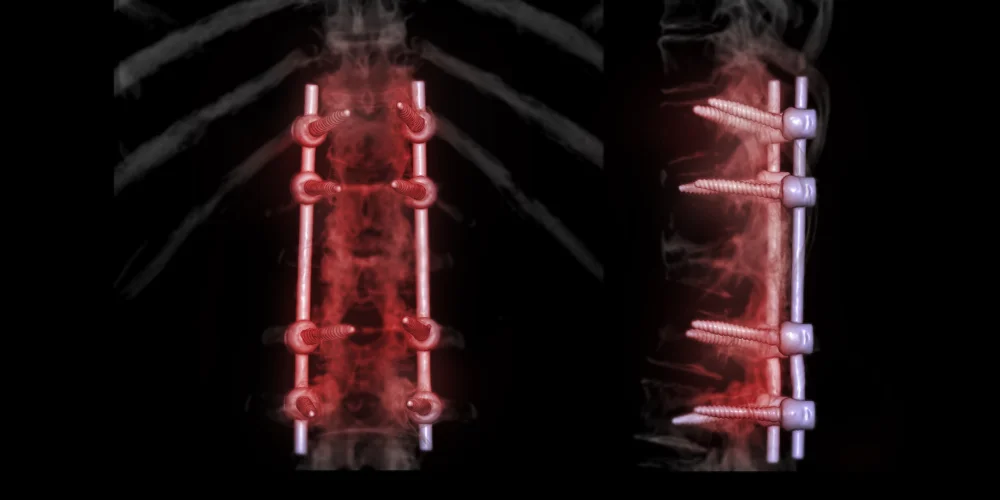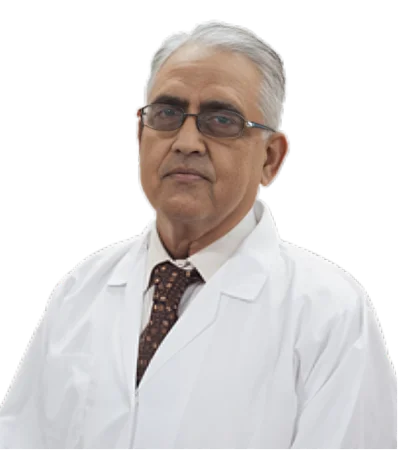Spinal Fusion Surgery
Effective Treatment for Chronic Back Pain and Spinal Instability
Spinal fusion surgery is an increasingly popular solution to treat chronic back pain and spinal instability by permanently joining two or more vertebrae together. At Chirayu Super Speciality Hospital, our skilled spine surgeons use sophisticated surgical techniques to bolster spine stability while relieving any related discomfort caused by degenerative conditions, trauma or other spinal disorders. Our ultimate aim is to enhance quality of life through providing personalized care throughout this journey.

What Is Spinal Fusion Surgery?
Spinal fusion surgery entails the permanent joining, or “fusing,” of two or more vertebrae in the spine by means of bone grafts, metal rods, screws or other devices such as metal rods. This process eliminates movement between fused vertebrae, providing stability to the spine while decreasing pain levels. Spinal fusion can often be recommended in situations such as degenerative disc disease, spinal stenosis, scoliosis fractures or spondylolisthesis where instability or pain exists in the spine.
Who Will Perform Your Spinal Fusion Surgery?
Chirayu Super Speciality Hospital provides experienced spine surgeons who specialize in spinal fusion surgeries at both traditional and minimally invasive approaches for each procedure performed on patients at Chirayu Super Speciality Hospital, making sure each person receives optimal and effective treatment plans tailored specifically to their own unique condition and goals. Our team offers both traditional and minimally invasive techniques for spinal fusion that ensure the most suitable care plan. We work closely with every individual to develop personalized plans tailored specifically for them and their specific condition/goals when considering surgery at Chirayu Super Speciality Hospital.
Types of Spinal Fusion Surgery
- Posterior Lumbar Interbody Fusion (PLIF) : Involves fusing vertebrae from the back of the spine using bone grafts and implants.
- Anterior Lumbar Interbody Fusion (ALIF) : Fusion is performed from the front of the spine, often used for lower back problems.
- Transforaminal Lumbar Interbody Fusion (TLIF) : A minimally invasive approach, fusing vertebrae from the side, reducing tissue damage and recovery time.
- Cervical Fusion : Fusion of the vertebrae in the neck to treat cervical spine conditions, such as herniated discs or fractures.
Symptoms Indicating Need for Spinal Fusion
Common indicators that an individual may require spinal fusion include chronic back pain that does not respond to conservative treatments, leg pain due to sciatica, numbness, tingling or weakness in legs, spinal instability or deformities like scoliosis – symptoms which significantly hinder daily activities and overall quality of life.
Diagnosis for Spinal Fusion Surgery
Evaluation is crucial when diagnosing spinal fusion surgery, including reviewing medical history, physical exam and imaging studies such as X-rays, MRI or CT scans to help establish its severity or degeneration, guiding decisions regarding surgery accordingly. These assessments help pinpoint areas of instability or degeneration while aiding decision makers on whether surgery would be beneficial.
Treatment Process
Spinal fusion surgery typically begins with anesthesia to ensure patient comfort. A surgeon then makes an incision in order to access the spine, depending on its fusion type. Bone grafts (from either within the patient’s own body or donated from outside sources) may then be placed between vertebrae to promote fusion; metal rods, screws or plates may then be added for stability during this process which may last several hours depending on its complexity.
Care and Recovery After Surgery
Recovery from spinal fusion surgery involves a hospital stay of a few days, followed by a period of rest and gradual return to activities. Pain management, physical therapy, and rehabilitation exercises are critical components of the recovery process, helping to restore strength, flexibility, and mobility. Most patients can resume normal activities within a few months, although complete healing and fusion may take several months to a year.
Advantages of Choosing Our Surgery Services
Specialized Spinal Surgeons
Expert in performing spinal fusion to treat various spine disorders, including herniated discs and scoliosis.
Cutting-Edge Techniques
Use of advanced materials and technologies for optimal fusion and stability.
Comprehensive Follow-Up Care
Ongoing monitoring and rehabilitation to ensure successful fusion and pain relief.
What Our Patients Say
Read about our patients positive experiences and how Chirayu Super Speciality Hospital has positively impacted their health and well-being.


My recovery from spinal fusion was quicker than expected. The surgery was effective, and I’m back to my routine activities.


I am grateful to the surgeons at Chirayu for their expertise in spinal fusion surgery. My back pain is gone, and I feel great!


The spinal surgery team at Chirayu provided excellent care. The procedure was successful, and the support during recovery was outstanding.


After my spinal fusion surgery at Chirayu, I’m finally pain-free and back to enjoying my daily activities without discomfort.
Meet Our Medical Specialists
Our experienced spine surgeons specialize in spinal fusion, offering advanced treatment options to relieve pain and improve spinal stability.
Frequently Asked Questions
Here, we provide answers to some of the most commonly asked questions to help you better understand about our surgery services. If you have any additional questions, please do not hesitate to contact us.
Risks may include infection, blood clots, bleeding, nerve damage, and issues related to anesthesia. Your surgeon will discuss these risks with you.
Spinal fusion surgery involves permanently joining two or more vertebrae to stabilize the spine and relieve chronic back pain.
Preparation involves a pre-surgical evaluation, imaging tests, discussing your medical history, and following pre-operative instructions from your surgeon.
It is recommended for conditions such as degenerative disc disease, spinal stenosis, scoliosis, fractures, and spondylolisthesis that cause pain or instability.
The surgery duration varies based on the complexity but typically lasts between 2 to 6 hours.



